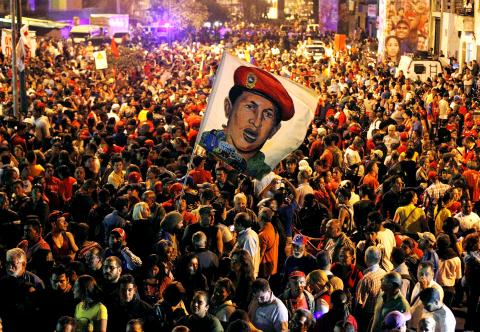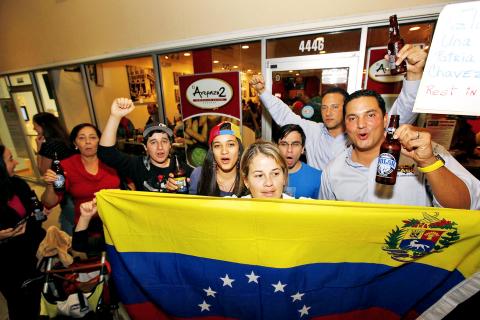Venezuelan President Hugo Chavez’s death has unleashed a flood of emotional tributes that his allies hope will help ensure the survival of his self-styled socialist revolution when voters elect a successor.
The 58-year-old died on Tuesday after a two-year battle with cancer that was first detected in his pelvis. He had suffered multiple complications following his latest operation on Dec. 11 last year and had not been seen in public since then.
Tens of thousands of Venezuelans immediately took to the streets to honor the flamboyant leader.

Photo: Reuters
The future of Chavez’s leftist policies, which won him the adoration of poor Venezuelans, but infuriated opponents, who denounced him as a dictator, now rests on the shoulders of Venezuelan Vice President Nicolas Maduro, the man he tapped to succeed him.
“In the immense pain of this historic tragedy that has affected our fatherland, we call on all the compatriots to be vigilant for peace, love, respect and tranquility,” he said.
Maduro, a 50-year-old former bus driver, will likely face opposition Miranda State Governor Henrique Capriles at the next election.

Photo: AFP
Venezuelan authorities said the vote would be called within 30 days, but it was not clear if that meant it would be held within 30 days or whether the date would be announced in that period.
One opinion poll gave Maduro a strong lead over Capriles, because he has received Chavez’s blessing as his heir apparent and is likely to benefit from the surge of emotion following the president’s death.
Some have suggested he could try to ease tensions with investors and the US, although, hours before Chavez’s death, Maduro alleged that “imperialist” enemies had infected the president with cancer as one of a number of conspiracies with domestic opponents.
A victory by Capriles would bring deep changes to Venezuela and would be welcomed by business groups and foreign investors.
“This is not the time to stress what separates us,” Capriles said in a statement on Tuesday night, calling for unity and respect for the loss that many felt after Chavez died.
“He was our father,” said Nancy Jotiya, 56. “He taught us to defend ourselves. Chavismo is not over.”
In Taipei, Ministry of Foreign Affairs deputy spokesperson Calvin Ho (何震寰) said Taipei offered its condolences to Venezuela.
Taiwan does not have diplomatic relationships with Venezuela, but had a representative office in the country from 1974 to 2009.
Additional reporting by Shih Hsiu-chuan

LONG FLIGHT: The jets would be flown by US pilots, with Taiwanese copilots in the two-seat F-16D variant to help familiarize them with the aircraft, the source said The US is expected to fly 10 Lockheed Martin F-16C/D Block 70/72 jets to Taiwan over the coming months to fulfill a long-awaited order of 66 aircraft, a defense official said yesterday. Word that the first batch of the jets would be delivered soon was welcome news to Taiwan, which has become concerned about delays in the delivery of US arms amid rising military tensions with China. Speaking on condition of anonymity, the official said the initial tranche of the nation’s F-16s are rolling off assembly lines in the US and would be flown under their own power to Taiwan by way

OBJECTS AT SEA: Satellites with synthetic-aperture radar could aid in the detection of small Chinese boats attempting to illegally enter Taiwan, the space agency head said Taiwan aims to send the nation’s first low Earth orbit (LEO) satellite into space in 2027, while the first Formosat-8 and Formosat-9 spacecraft are to be launched in October and 2028 respectively, the National Science and Technology Council said yesterday. The council laid out its space development plan in a report reviewed by members of the legislature’s Education and Culture Committee. Six LEO satellites would be produced in the initial phase, with the first one, the B5G-1A, scheduled to be launched in 2027, the council said in the report. Regarding the second satellite, the B5G-1B, the government plans to work with private contractors

‘NARWHAL’: The indigenous submarine completed its harbor acceptance test recently and is now under heavy guard as it undergoes tests in open waters, a source said The Hai Kun (海鯤), the nation’s first indigenous defense submarine, yesterday began sea trials, sailing out of the Port of Kaohsiung, a military source said. Also known as the “Narwhal,” the vessel departed from CSBC Corp, Taiwan’s (台灣國際造船) shipyard at about 8am, where it had been docked. More than 10 technicians and military personnel were on deck, with several others standing atop the sail. After recently completing its harbor acceptance test, the vessel has started a series of sea-based trials, including tests of its propulsion and navigational systems, while partially surfaced, the source said. The Hai Kun underwent tests in the port from

MISSION: The Indo-Pacific region is ‘the priority theater,’ where the task of deterrence extends across the entire region, including Taiwan, the US Pacific Fleet commander said The US Navy’s “mission of deterrence” in the Indo-Pacific theater applies to Taiwan, Pacific Fleet Commander Admiral Stephen Koehler told the South China Sea Conference on Tuesday. The conference, organized by the Center for Strategic and International Studies (CSIS), is an international platform for senior officials and experts from countries with security interests in the region. “The Pacific Fleet’s mission is to deter aggression across the Western Pacific, together with our allies and partners, and to prevail in combat if necessary, Koehler said in the event’s keynote speech. “That mission of deterrence applies regionwide — including the South China Sea and Taiwan,” he